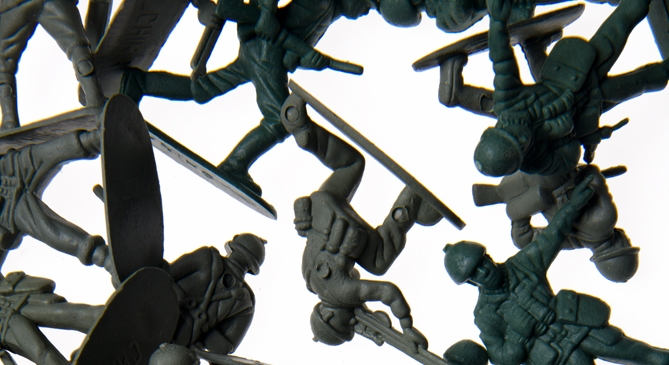
The way forward for European defence
The EU has lost its military virginity. At the request of the UN, the EU sent 1,500 troops to Congo at the beginning of June 2003. The Congo mission is significant for two reasons: it is both the first autonomous EU mission - one that does not rely on NATO's help - and the EU's first military operation outside Europe. Moreover, since the US showed no enthusiasm to participate, NATO was not even asked to conduct the mission. This establishes a precedent: NATO will not always have a 'right of first refusal' over a military mission that either the alliance or the EU could manage.
However, in other respects the dispatch of peacekeepers to the Congolese town of Bunia is nothing new. Fifteen EU member-states have approximately 50,000 peacekeepers deployed in the Balkans, Afghanistan, Africa, and Iraq. What the EU has not yet undertaken is a more ambitious 'peacemaking' operation, for example the separation of two sides in a civil war, which would mean committing European troops to a dangerous battle-zone.
The EU is likely to manage more military missions in the future. The US priorities are North Korea, Iran and Iraq. America will not often want to become involved in conflicts in the band of instability that runs around the EU's eastern and southern flanks, and stretches down to sub-Saharan Africa. For example, the EU is considering deploying peacekeepers to replace Russian troops in the Transdnistria region of Moldova.
In addition, the EU could play a useful role in giving the UN the rapid reaction capability that it currently lacks. The UN can usually raise enough peacekeepers. What it cannot do so easily is find troops for an intervention force, to fly into a crisis zone as soon as bloodshed starts. For example, the UN was unable to intervene quickly enough in East Timor in 1999. The Bush administration is unlikely to provide the UN with US forces. But the EU could be willing to help the UN: countries such as Britain and France have elite forces which can move into a war-zone at short notice.
However, most EU states have too many immobile conscript troops and too few elite forces. If the Europeans are going to succeed as peacekeepers and peacemakers they need to make a big investment in professionalisation (some countries like Britain, France, Ireland, Spain and the Netherlands already have professional forces), in training and in equipment. The new EU member-states have only a very limited capacity to engage in high intensity warfare.
Future EU missions need to deploy rapidly, and when they get there they are more likely to face a problem from guerillas than from conventional tanks and aircraft. The Europeans therefore need more professional troops that can move at short notice, plus special forces which are skilled at using intelligence. That is why, when Jacques Chirac and Tony Blair met at Le Touquet in February this year, they agreed that the EU should be able to deploy air, sea, and land forces within 5-10 days. That would be a great improvement on the EU's current plan for a so-called reaction force that should be able to move at 60 days' notice. EU leaders should support this initiative, and beef up the numbers of elite and special operations forces that are available for EU missions. This effort should reinforce NATO's own plan for a rapid reaction force: the same troops would be available to the EU and NATO.
The Europeans need not invest in all the things that the Americans do. They do not have the same global priorities, and do not intend to 'shock and awe' their opponents. Furthermore, European governments are not willing to spend comparable amounts of money on defence, which limits their choices further - Europeans spend roughly 2 per cent of GDP on defence whereas the US spends close to 3.5 per cent. So the Europeans cannot afford to invest in many cutting-edge technologies such as unmanned aerial combat vehicles and miniature robots for intelligence gathering. Instead the Europeans should place more emphasis on pooling existing military equipment. For example, countries could share the costs of maintaining and operating aircraft, since they often buy the same type. The recent decision by France and Germany to set up a joint 'top gun' school for their attack helicopter pilots and mechanics is a small step in the right direction.
EU leaders should also assess what additional capabilities the Union needs to counter new security threats. In June 2003 EU foreign policy chief Javier Solana presented the first draft of an EU security strategy to member-state governments. The document contains surprisingly tough language that rightly focuses on threats like terrorism, the proliferation of weapons of mass destruction (WMD), and failed states.
The EU cannot tackle these new priorities without improving its record of intelligence co-operation. European governments ended up so divided in Iraq, partly because they did not share their threat assessments. Now that the EU itself is running military operations, it needs its own intelligence-pooling arrangements. A certain amount of national intelligence is fed into Javier Solana's situation centre in the Council of Ministers. And the member-states are making tentative moves to share internal security intelligence assessments at the EU level through Europol (the European police body). But they need to step up the quantity and quality of the political and military assessments that they share with their EU partners.
As a start, member-states should create a European intelligence committee, working for Javier Solana. The committee would bring together senior intelligence officers seconded from national agencies, and filter various national assessments to produce common assessments for the foreign ministers and Javier Solana. The EU will contribute more effectively to global security if it can develop stronger elite forces and better intelligence assessment capabilities.
